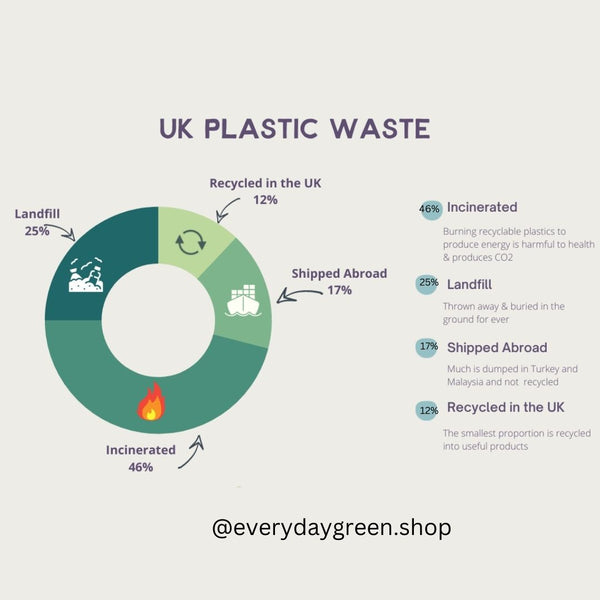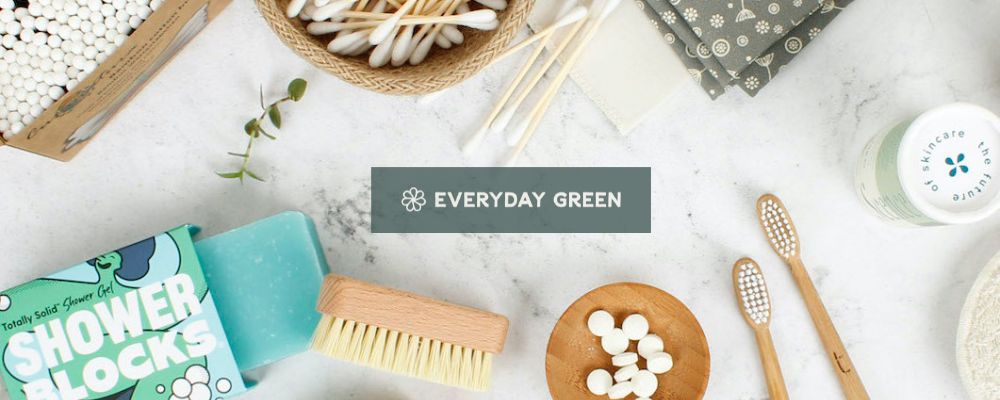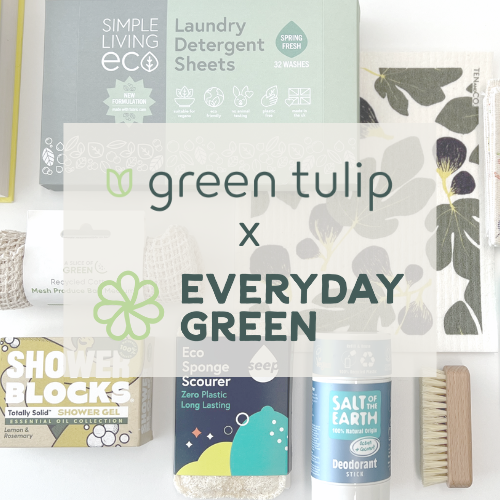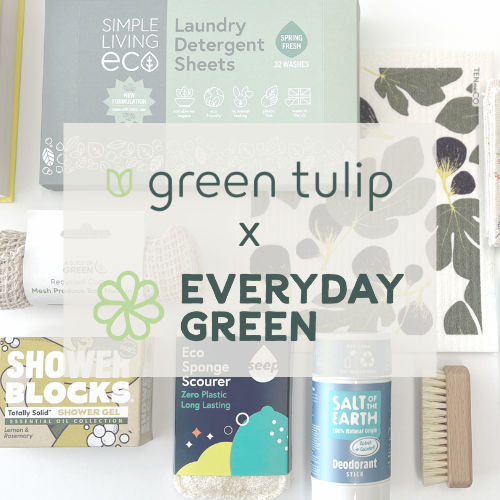Green Guide to Plastic
In this Green Guide, I delve into the topic of plastic and provide you with a comprehensive understanding of its impact on the environment. At the end I also provide simple ways that everyone can start rfeducing their use of single-use plastic. Armed with this information, you can make an informed decision on how you choose to use plastic in your everyday life.
Overview
Plastic hasn't been around for very long - in fact it only started to become mass produced in the mid 1940's and took off in the 60's and 70's as consumers began to realise it was a cheap, versatile alternative to many traditional materials such as wood, paper, glass and ceramic. Plastic can be made into so many different types of product that can be flexible, transparent, airtight, waterproof, strong, lightweight, easily mouldable, sanitary and indestructible.
At the time, most people had no concern for how this seemingly miracle material would be disposed of.It was even touted as an environmentally friendlier alternative to things like paper bags in supermarkets as plastic bags have a lower overall pollution rating than paper bags - plus - why cut down all those trees!
People now know, of course, that plastic's incredible properties - its versatility and low cost - come with a major downside. They are at the root of the plastic pollution crisis we face today, a crisis that we have been facing for at least 40 years.
What is plastic?
Let's start at the beginning with a great question. What exactly is plastic? Plastics are synthetic materials that are made from natural materials such as cellulose, coal, natural gas, salt and crude oil. However, it's important to note that despite being made from these "natural materials," plastic isn't necessarily environmentally friendly. Its production and disposal can have negative impacts on our planet.
Guide to different types of plastics and hidden plastics
There are numerous types of plastics available, each with its own characteristics. While some plastics can be recycled, others cannot. Additionally, there are bio-plastics, biodegradable plastics, and recycled plastics. It's important to note that certain plastics may be concealed within products and not easily identifiable. So, how can we differentiate between them?
What type of plastic is it?
Plastic is often stamped with a number from 1 to 7, indicating whether or not the item can be recycled. Essentially, plastics can be categorized into these 7 categories:

Recycled Plastic
Recycled plastic is plastic that has been produced from plastic that has already been used and recycled through industrial processes. It's what the plastic you recycle at home that's collected in kerbside recycling will hopefully be turned into!
Buying products made from recycled plastic keeps the plastic out of the waste stream for one more use or lifetime and reduces the amount of virgin plastic (new plastic from extracted oil) needed to produce new items. Recycled plastic is especially good for products that have a long lifetime, such as classic toys made from recycled plastic - as it will keep it out of landfill for many years to come.
But, eventually recycled plastic products will also need to be disposed of and the options are limited. Plastic has a limited number of times it can be recycled before the quality degrades and it will need to be incinerated or landfilled.
Ocean bound plastic
Ocean Bound Plastic (OBP) is plastic waste defined as “at risk of ending up in the ocean”. OBP is estimated to generate 80% of plastic marine litter.
This is plastic that is collected for recycling within 50km of an ocean. Some organisations are now using OBP solely in their manufacturing.
Bio Plastic
Bio-based plastics are fully or partially made from biological resources, rather than fossil raw materials. For example plastic can be made from vegetable fats and oils, corn starch, straw, woodchips and recycled food waste. They are not necessarily biodegradable or compostable.
The often-cited advantages of bioplastic are reduced use of fossil fuel resources, a smaller carbon footprint, and faster decomposition. Bioplastic is also less toxic and does not contain bisphenol A (BPA), a hormone disrupter that is often found in traditional plastics.
If bioplastics were to end up in the ocean, they would break down into tiny pieces similarly to traditional plastics. According to BBC Science Focus, bio plastics take only three to six months to fully decompose, far quicker than traditional plastic that can take hundreds of years. They are said NOT to contribute to micro plastic.
Some bio plastics are said to be biodegradable, but for biodegradation to occur, three basic resources are required – heat, light and oxygen. In a landfill site, waste is entombed, creating a complete absence of light and oxygen. If a biodegradable plastic or bioplastic ends up in a landfill site it may never decompose. It will not usually biodegrade in a home composter, unless specifically labelled 'Home Compostable'.
Hidden Plastic
Did you know the following everyday items contain plastic? Chewing gum, tea bags, envelopes, drinks cartons, takeaway paper coffee cups, wet wipes...
As more people are finding out about the hidden plastic in these items, companies are beginning to change their manufacturing processes to either exclude plastic or use bio-based plastics that claim to be biodegradable. An alternative could be to replace many of these items with reusables such as cloth wipes, reusable coffee cups and loose tea.
For an in depth guide check out: The 7 types of plastic and can you recycle them?
Effects of Plastic on the environment
The production and disposal of plastic are the two main areas where it has an impact on the environment.
Some of the impacts of plastic production and disposal include:
- Temperature rises from fossil fuel burning
- Land, air and ocean pollution with plastic and micro plastics
- Huge plastic islands are choking our oceans and killing wildlife
- Plastic particles have been found in the most remote locations such as Arctic ice (The BIG North Pole) and living tissue
- Plant and animals are carrying plastics in their cells, with unknown long term health effects
Plastic is quite simply in the air we breathe, the water we drink and the food we eat.
Plastic does have many significant uses; however, the downsides are quite significant as well. Without wanting to demonize plastic, it is clear that we cannot continue producing and disposing of such large quantities of plastic as we have been doing for decades.
As David Attenborough said:
"There are so many simple things we can do," he said. "It's absurd to suggest we can do totally without plastic but there are so many areas where we use plastic without a thought."

We need to cut off the tide of plastic that is entering the waste stream and the oceans.
Read Earth.Org For a full account of how plastic pollution affects wildlife on land and the oceans .
Disposal of Plastic
Not all plastics can be recycled, many are notoriously difficult to recycle, many are not collected in kerbside recycling and will need to be disposed of at local recycling facilities. Even when recycled, the reuse rates are not high and plastic has a limited number of times it can be recycled before the quality degrades and it will need to be incinerated or landfilled.But what about recycling as a solution? The stats on recycling plastic are not good.
Taken from Everyday Plastic: The Big Plastic Count
How plastic waste is dealt with in the UK:
- 46% Incinerated. Burning plastic to produce energy is harmful to health and releases CO2.
- 25% Landfill. Thrown away and buried in the ground forever. Potentially leaching chemicals into the ground.
- 17% Shipped abroad. For other countries to deal with by recycling, incinerating or dumping. This has huge impact on the health of people living nearby.
- 12% Recycled in the UK. New products made from recycled plastic.

The results of The Big Plastic Count send a clear and urgent message: recycling is not enough, we must turn off the plastic tap. The UK’s recycling systems cannot cope with the amount of plastic packaging waste leaving our homes (estimated to be a staggering 1.85 billion pieces per week) of which only 12% is likely to be recycled in the UK.
Too much focus is placed on recycling and making plastic recyclable rather than reducing plastic in the first place. Recycling plastics is not the silver bullet that many think it is. A circular economy needs to be built around materials that can be reused and recycled many times over, which most plastic cannot.
What are the benefits of reducing plastic waste?
The benefits of reducing plastic are immense. While it may be impossible to completely eliminate all plastic from our lives, I am referring to the reduction of single-use plastics like food packaging, takeaway containers, hot drink cups, and cold drink bottles.
There are some plastics in the home that can easily be replaced with natural material alternatives, such as cloth, scourers, cooking utensils, and clothing. Additionally, unnecessary plastic bottles, such as new spray bottles for cleaning products, shampoo, and other personal care items, could be refilled instead.
Health
Firstly are benefits to our health. Research has shown that plastic is a serious endocrine (hormone) disrupter. Our bodies and other animals are in a delicate balance of chemicals and the reactions they cause. Chemicals found in plastics that leach into our food and drinks can disrupt or even mimic these bio chemicals and lead to imbalances and poor health.
Removing plastic packaging from your food and drink is the safest way to avoid this.
Reduce micro plastic pollution
Micro plastic not only enter our bodies, they are also being washed down drains into water systems when plastic is used in the home. Plastic cloths, scourers, clothes like polyester and fleece all shed micro plastics. Again finding natural alternatives will prevent these particles entering our rivers, oceans and atmosphere.
Prevent waste
Preventing waste - by reusing eg water bottles, produce bags, lunch boxes we cut down on the waste we produce - making life simpler. No more memorising or looking up recycling numbers every time you need to dispose of a piece of single use plastic.
Save money
Saving money - buying a reusable water bottle or coffee cup may require an initial investment, but once you make that investment, you can enjoy free water anywhere you go. Additionally, taking out a coffee from home is cheaper than picking up a takeaway.
If you fancy a takeaway - many places now offer savings on refills- the Refill app shows you all the places near you that will offer free water refills and discounted hot drinks.
Top 10 alternatives to single-use plastics for everyday use
Now we know how difficult plastic is to dispose of or recycle and the harm it can do, what should we do?
Replacing single use plastic in everyday life is probably the biggest impact you can have personally on plastic waste problems.
Some of the most frequently asked questions we have are:
"What are the easiest/best/most impactful plastic swaps?"
We want to reduce single use plastic but sometimes it's difficult to know where to start so we thought it would be useful to list the top 10 alternatives to single use plastic that I use everyday, that save loads of plastic waste and are affordable.

Top 10 alternatives to plastic
In the bathroom
1. Salt of the Earth deodorant - refill and refillable stick. Perfect for those trying to reduce their use of disposable plastics, this 100% natural deodorant stick is packed in a 100% recycled plastic tube and is user friendly and durable. Refills are available in card tubes.
2. Scence lip balm is hand made from 100% natural plant based ingredients. It's designed to nourish, soothe and comfort dry and sore lips and - what's more - it's plastic free and totally compostable. A SPF30 version is also available, reef safe and plastic free.
3. A Slice of Green organic cotton facial pads are designed as a replacement for disposable, single use cleansing wipes or cotton wool and make a great addition to the plastic free bathroom. They're large, soft, washable and I love them.
4. Shower Blocks are just the best. A solid bar of shower gel, totally plastic free. The lime and sandalwood fragrance oils offer a wonderful citrusy-fresh and woody combination for an invigorating start to the day - I need it. Now available in 100% natural essential oils collection - divine!
In the kitchen
5. You can't get better than a dish brush with a replaceable brush head, which is available to purchase separately. Sustainably certified with plant bristles - it works really well and looks great by the sink.
6. Seep compostable sponge with loofah scourers. These natural sponges have a loofah scouring pad and are tough on stains and stuck-on food, but gentle enough for non- stick cookware. The sponge is absorbent and good for cleaning up spills and wiping down surfaces. Great for washing up and also for kitchen and bathroom cleaning. Completely compostable too.
7. All MACK biopods are plastic free. I particularly like the loo cleaner - To Rimfinity. This ocean friendly biotech toilet gel comes in a handy BioPod designed to dissolve in a squirty repurposed toilet gel bottle filled with warm water. Its gloopy consistency sticks to the bowl and continues to clean! Check out their reusable spray bottle made from Ocean Bound plastic.
8. A Slice of Green unpaper towels is my next choice. Absorbent, reusable and organic cotton. They will last and last and finally after a long and useful life, they will completely decompose in your compost as they are fully natural cotton.
Out and about
9. I do love my Qwetch insulated bottle, in fact we have four of them as my boys use them too. They're perfect for school, work, sports, holidays, days out. We rarely, if ever need to buy plastic water bottles anymore and are happy to ask at cafes for refills through the day. We all have the same type of bottle but different lids! Check them out!

10. And at the market, farm shop or supermarket, I use cotton mesh produce bags to buy exactly the amount of loose fruit and veg that I need. Cutting plastic and food waste- win win. These bags are made from recycled cotton which increases their sustainability - they are practical and perfect.
So that is my list. It was hard to stop, I wanted to add so many things! Like food containers, lunchboxes and coffee cups - if you want to check out our full range of products to help you cut down on single use plastic, head over to our website and our Plastic Free Collection.
Actually - dont forget your toothbrush! Truthbrush bamboo toothbrushes are the best manual toothbrushes I have used. We all agree they are effective, look great and cut down our plastic waste in the home!

Creative ways to reduce your use of single use plastics & reuse what you already have
Reducing single use plastic doesn't have to mean buying all new reusables. We cannot shop our way out of an excess of plastic in the world! The most eco-friendly thing to do is always use and reuse what you have.
Ignore contrived eco-pressure, mostly from social media, to have beautiful ‘sustainable’ homes. Homes where not a scrap of plastic exists. Some popular zero-waste accounts can make you feel that the only solution is to get rid of useable plastic items. Whereas it may well be that you have perfectly good items that can be used and reused again and again to reduce reliance on single use. Or you may have items which can be repurposed. Making reusable cloth wipes out of an old towel, tee towel or even a favourite tee shirt that has become too worn out to wear is a perfect example.
It's worth remembering that even 'Eco-Friendly' items have an impact on the environment and any purchases should be carefully considered.
For example: 'Bags for Life' plastic bags need to be used 4 times in order for them to be more environmentally friendly than single-use plastic bags. Paper bags need to be reused 3 times, and cotton bags need to be reused over 130 times before they are more environmentally friendly than a single-use carrier bag. (Source: EA LCA assessment).
Production of paper and cloth bags produces a greater amount of pollution than plastic bags, so there's more to think about than simply ease of disposal.
Useful Reuses
Here are a few ideas of items you can reuse or repurpose to cut down on single use plastic:
- Make flannels and cloth wipes instead of using disposable wipes
- Use beeswax wraps instead of plastic film
- Freeze foods in glass jars
- Wrap bread in cloth bags or t towels
- Reuse any existing 'Tupperware' or takeaway containers until they break-tomato stains are not Instagram worthy but they don't matter!
Actions you can take
- Shop at bulk stores and refill stations
- Get milk delivered or use a milk vending station with your own bottles
- Look for solid and plastic free versions of your home cleaning, beauty and personal care products. For example shampoo and conditioner bars, shower blocks, toothpaste tabs, laundry sheets, cleaning refill pods.
Useful Kits
Set up a few useful kits so you have everything ready and together, then you'll be much more likely to remember them.
- A going out kit - reusable bottle, coffee cup, folded bag in your pocket, snack container
- A shopping kit - produce bags, containers for meat or bulk dry goods like cereal, shopping bags
- A holiday/weekend away kit - shampoo & conditioner bars, shower block, laundry sheets, plus your reusables kit!
Buying gifts
Look for plastic free packaging, plastic free (naked) cards and gift wrap that is natural. We highly recommend Green Tulip for gifts. They only ever use plastic free gift wrap and packaging for their beautiful selection of ethical gifts.

Ditch the gift wrap for a paper bag or cloth scarf as part of the gift. The Japanese art of gift wrapping, Furoshiki is a beautiful way to present a gift.
Buying sustainable alternatives
By all means, switch to more sustainably produced alternatives when items need replacing. If you need a new coffee cup, water bottle or lunchbox, shopping with a sustainable supplier will minimise the environmental impacts of your purchase. Have a look at the Everyday Green range of reusable for example.

In the meantime use your old plastic Tupperware with pride, tomato stains, and all. Reuse any plastic bags that come your way. Don’t get rid of useful things just because they don’t look the part. That's a far more sustainable way to live, and easier on you too.
And finally - How to educate yourself further on reducing plastic waste
Keep following Everyday Green on social media for our updates on plastic use and how to cut down.
Instagram: @greentulip.shop
Facebook: @Greentulip.est2007
Other people and groups we recommend are:
Plastic Free July to join millions of people reducing their plastic waste.
Plastic Free July® is a global movement that helps millions of people be part of the solution to plastic pollution – so we can have cleaner streets, oceans, and beautiful communities.
Will you be part of Plastic Free July by choosing to refuse single-use plastics?
Less Plastic An ocean-loving, non-profit Community Interest Company based in South Devon, UK.
They set up Less Plastic in 2015 to raise awareness of ocean plastic and provide practical ways for individuals & organisations to make a difference by using less plastic and taking actions that restore nature.
You can get involved by making a #LessPlasticPledge and sharing our campaigns to inspire your friends, family, and colleagues to make positive changes too.
Everyday Plastic For lots of information about plastic use and disposal in the UK, and the Big Plastic Count. An evidence-led social enterprise delivering accessible learning and campaigns that tackle the effects of the plastic problem that are felt across our society.
Zero Waste Chef Concerned with the planet’s plastic pollution problem, Anne Marie went plastic-free in 2011. Her social media, books and website are full of great and practical ideas on living as low waste as possible. And plastic free recipes too.








